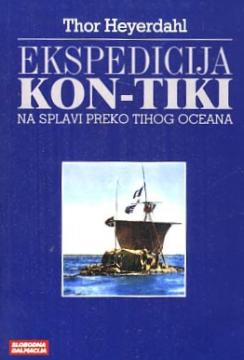
Ekspedicija Kon-Tiki
Kon-Tiki ekspedicija bila je putovanje splavom preko Tihog oceana od Južne Amerike do polinezijskih otoka, a predvodio ju je norveški istraživač i pisac Thor Heyerdahl.
Splav je dobio ime Kon-Tiki po inka bogu Viracochi, za kojeg se tvrdilo da je “Kon-Tiki” stari naziv. Heyerdahlova knjiga o ekspediciji nazvana je “Kon-Tiki ekspedicija: Splavom preko Južnih mora”. Dokumentarni film iz 1950. godine osvojio je Oscara za najbolji dokumentarni film, a 2012. godine snimljen je igrani film koji je bio nominiran za Oscara za najbolji strani film. Ekspedicija Kon-Tiki financirana je privatnim zajmovima, uz donacije opreme od Američke vojske. Heyerdahl i mali tim otputovali su u Peru, gdje su uz pomoć brodogradilišta koje su osigurale peruanske vlasti, izgradili splav od balzinih trupaca i drugih autohtonih materijala u stilu koji su zabilježili španjolski osvajači. Putovanje je započelo 28. travnja 1947. godine. Heyerdahl i pet suputnika plovili su splavom 101 dan preko 6.900 km (4.300 milja) preko Tihog oceana prije nego što su se sudarili s grebenom kod Raroie u Tuamotusima 7. kolovoza 1947. godine. Posada je uspješno stigla na kopno i svi su se sigurno vratili. Heyerdahl je vjerovao da su ljudi s Južne Amerike mogli doseći Polineziju u prekolumbovsko doba. Njegov cilj u organiziranju ekspedicije Kon-Tiki bio je pokazati da nije bilo tehničkih razloga koji bi ih spriječili da to učine, koristeći samo materijale i tehnologije dostupne ljudima tog vremena. Iako je ekspedicija koristila neku modernu opremu, poput radija, satova, karata, sekstanta i metalnih noževa, Heyerdahl je tvrdio da su to bili sporedni elementi u svrhu dokazivanja da sama splav može obaviti putovanje. Ova ideja dobila je potporu iz statističke analize genetskog dokaza o kontaktu između Južne Amerike i Polinezije. Međutim, Heyerdahlova potpuna hipoteza o južnoameričkom podrijetlu polinezijskih naroda danas se uglavnom odbacuje. Većina arheoloških, jezičnih, kulturnih i genetskih dokaza podržava zapadno podrijetlo Polinezijaca, iz jugoistočne Azije, koristeći sofisticirane tehnologije višetrupnih plovila i navigacijske tehnike tijekom austronezijske ekspanzije. Postoji dokaz o nekom protoku gena s Južne Amerike na Uskršnji otok. 2020. godine neki istraživači objavili su istraživanje.
Nema primjeraka u ponudi
Poslednji primjerak je nedavno prodan.





